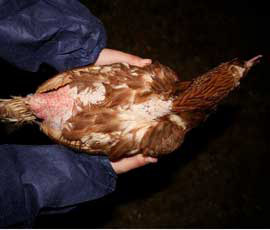Feather loss is a perennial problem for poultry

Good feather cover is a welfare matter, regardless of the impending ban on beak trimming, Stephen Lister, chairman of the DEFRA steering group for the Beak Trimming Action Group, told this week’s West Country Layers Association’s annual conference.
Mr Lister said: “Whatever happens [with the beak trimming ban] we still have feather problems with trimmed flocks.
“Feather cover is critical to bird health. If you’ve got a poorly feathered flock then it’s not as robust.”
He said that poor feather cover increased the risk of gut problems and other health concerns, such as spotty liver. It also meant that birds were using feed just to maintain body temperature, not for egg production.
“A poorly feathered flock gives an indication of poor health,” he added.
Despite this, he said that new studies into managing aggressive behaviour were proving effective. “There are things that we can learn and are still learning.”
He said that providing enrichments and careful management – such as avoiding surprises – had proven to reduce incidence of feather pecking. And he pointed to the Assurewell guide to managing feather loss as a good resource.
Mark Williams, chief executive of the British Egg Industry Council, said that he believed that a ban on beak trimming in 2016 was too soon. “It is premature and should be put back,” he told the conference. He added that DEFRA had agreed to fund an enriched cage trial, in conjunction with the Scottish Agricultural College, to build up evidence about the issue.
